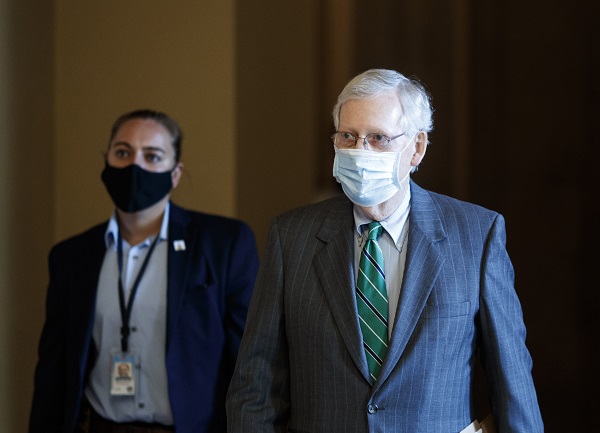
Washington, (Samajweekly) The US Senate has passed a stopgap funding bill, known as the continuing resolution legislation, to keep the federal government open until December 11, averting the possibility of a shutdown.
Just hours before a midnight deadline when the funding was set to expire, the Republican-majority Senate passed the bill on Wednesday by an 84-10 vote, reports CNN.
It is now expected to be signed by President Donald Trump.
The Senate’s signing of the bill came after it was unveiled by Democratic lawmakers from the US House of Representatives on October 21.
During the unveiling, House Speaker Nancy Pelosi had said: “The Continuing Resolution introduced today will avert a catastrophic shutdown in the middle of the ongoing pandemic, wildfires and hurricanes, and keep government open until December 11, when we plan to have bipartisan legislation to fund the government for this fiscal year.
“We continue to believe that the Congress should complete its work by passing full appropriations bills by December, which the House has already done.”
According to an NBC News report, the bill includes a bailout for farmers in exchange for boosts in funding for nutrition benefits for poor families requested by Democrats.
It will also continue to fund various parts of the federal government.
Meanwhile, Pelosi and Treasury Secretary Steven Mnuchin met earlier on Wednesday to discuss the next round of coronavirus aid.
Following the meeting, she said that the House plans to vote on Thursday on an updated aid package.
“We will be proceeding with our vote on the updated Heroes Act in order to formalise our proffer to Republicans in the negotiations to address the health and economic catastrophe in our country,” NBC News quoted the veteran Democrat as saying.
Also on September 28, House Democrats unveiled a scaled down $2.2-trillion coronavirus relief package in an effort towards clinching a bipartisan deal before the November 3 presidential election.
The bill dubbed, Heroes Act is $1.2 trillion less than the one passed by the House in May which was rejected by the Senate Republicans, The Hill news website reported.
It includes $436 billion in emergency aid for state and local governments; $225 billion for schools and child care; an additional round of $1,200 stimulus checks for most Americans; money to restore $600 expanded unemployment payments through January; $75 billion for testing, contact tracing and other health care efforts; billions for housing assistance; and funding to shore up the census, US Postal Service and elections.
In July, Senate Republicans released their $1 trillion proposal, but lawmakers failed to bridge their differences before the August recess.
Earlier this month, the Senate again failed to advance a Republican Covid-19 relief bill, which contained roughly $650 billion in total spending, with new funding of around $300 billion and repurposed previously approved spending of $350 billion.
It also included extra weekly unemployment benefits at a reduced level of $300, but Democrats want to maintain the $600 benefits.
In August, Trump signed several orders to extend certain Covid-19 economic relief, but analysts believe that those measures are unlikely to provide a meaningful boost to the overall economy.








